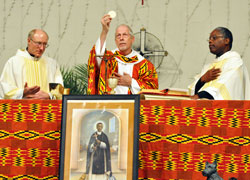Saint’s humility and concern for the poor worth emulating, priest says

Divine Word Father Sam Cunningham, associate pastor of St. Patrick Parish in Fort Wayne, Ind., in the Diocese of Fort Wayne-South Bend, elevates the Eucharist during the St. Martin de Porres feast day Mass on Nov. 3 at St. Luke the Evangelist Church in Indianapolis. Father Steven Schwab, left, pastor of St. Thomas Aquinas Parish in Indianapolis, and Father Kenneth Taylor, right, pastor of Holy Angels Parish in Indianapolis and director of the archdiocesan Office of Multicultural Ministry, concelebrated the liturgy. (Photos by Mary Ann Garber)
By Mary Ann Garber
In today’s economically challenged world, the holy life of St. Martin de Porres reminds us that the needs of impoverished people must never be ignored by those who have the means to help them, Divine Word Father Sam Cunningham emphasized during his homily for the Peruvian saint’s feast day liturgy on Nov. 3 at St. Luke the Evangelist Church in Indianapolis.
“Martin would say, ‘You can never forget about the poor,’ ” said Father Cunningham, associate pastor of St. Patrick Parish in Fort Wayne, Ind., in the Diocese of Fort Wayne-South Bend. “He would ask, ‘What about them?’ ”
Sponsored by the archdiocesan Office of Multicultural Ministry, the Mass brought Catholics from many cultures together to honor God and pay tribute to the humble, biracial Dominican brother who was born in 1579 in Lima, Peru, and dedicated his life to serving the poor.
“Martin showed people how to live—not for himself, but for others,” Father Cunningham said. “… Martin reached out with his life and with his healing to show that God was present to the people on the fringes” of society.
“He took on the full meaning of the Scriptures about how we need to live the covenants of the Old [and New] Testaments,” Father Cunningham explained. “… He humbled himself and took the form of a slave.”
Martin’s father was a Spanish gentleman and his mother was a freed black woman from Panama.
Because of his mixed race, Martin was scorned by many people in 16th century Peru. He joined the Dominican order as a lay brother at age 15, and worked as a barber, farm laborer and infirmary aide among other chores.
His love for people and animals was all-embracing, and in response to his faithful service it is said that God endowed him with spiritual graces as well as the gifts of bilocation, elevation and healing.
Martin was a friend of St. Rose of Lima. He died on Nov. 3, 1639, and was canonized on May 6, 1962.
Our lives may be difficult at times, Father Cunningham said, but St. Martin de Porres calls us to remember that “there are always others that suffer more than we do,” and then to respond with charitable acts to help them.
St. Monica parishioner Percy Consiglieri of Indianapolis, a native of Peru who immigrated to the United States 20 years ago, works as a teacher and translator for Hispanics and Latinos.
The festive, multicultural Mass “is one of the few expressions of our universal Catholic Church,” Consiglieri said after the liturgy.
“The Latino population in the United States comes here to serve,” he said. “… They look for a job—they look to serve—to help their families [by sending money to their home countries]. … They give of themselves.”
Franciscan Sister Jannette Pruitt, project coordinator for the National Black Catholic Congress XI to be held on July 19-22, 2012, in Indianapolis, said celebrating the St. Martin de Porres feast day Mass “brings the African-Americans and Hispanics together” in praise and worship of God each year.
“We are bringing people together through the glory of God, praising him together,” Sister Jannette said. “We are not off in our little corners. … All of the cultures are coming together to praise God.” †
